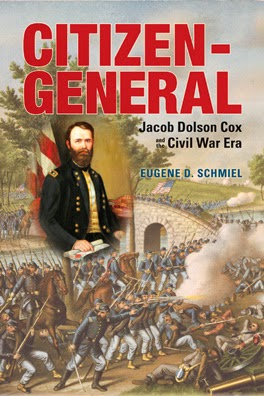
""Citizen-General" Jacob Dolson Cox and the Civil War Era"" Topic
1 Post
All members in good standing are free to post here. Opinions expressed here are solely those of the posters, and have not been cleared with nor are they endorsed by The Miniatures Page.
Please do not post offers to buy and sell on the main forum.
For more information, see the TMP FAQ.
Back to the ACW Media Message Board
Areas of InterestAmerican Civil War
Featured Hobby News Article
Featured Link
Top-Rated Ruleset
Featured Showcase Article
Featured Workbench Article Hate having to scratchbuild your own masts? Not any more...
Featured Profile Article If you were a kid in the 1960s who loved history and toy soldiers, you probably had a WOW figure!
Featured Book Review
|
| Tango01 | 26 Jun 2014 12:03 p.m. PST |
"Given Major General Jacob D. Cox's more than solid Civil War combat record and his deep influence on the historiography of the conflict through his many writings, it's surprising more hasn't been written about him. In his seven decades of life, Cox went in and out of a number of careers and avocations. In addition to being a fine soldier, he was a divinity student, lawyer, politician, cabinet secretary, amateur scientist, law school professor, university president, and historian. All of these phases of the Ohioan's life are covered in Eugene Schmiel's biography Citizen-General: Jacob Dolson Cox and the Civil War Era but the book wisely focuses on Cox's Civil War career, his historical writings, and his political offices, the first two exemplary in scope and accomplishment and the last perhaps a great lost opportunity. Cox and Schmiel find themselves in agreement that the general's best moments were during the battles of South Mountain and Franklin. However, one should not overlook Cox's 1861 Kanawha Campaign because of its small scale. In a largely independent role, his successful campaign, after the initial mishap at Scary Creek, was one of the ablest offensive operations conducted by any Union general during the first six months of the war. Schmiel's summaries of Cox's campaigns are solid overall, though one might wish for more detailed insight into Cox's style of generalship. Cox, a political general, was able to cultivate effective working relationships with high ranking professional army officers, an important trait absent in many high ranking officers drawn from civilian life, and earned their respect to the degree of their appointing Cox to critical positions of great authority (ex. co-leading the IX Corps during the Maryland Campaign and commanding the line at Franklin) and listening to his advice. With Schmiel accepting Cox's justifications and excuses for IX Corps's poor showing at Antietam, both subject and biographer seem equally dismayed as to why Cox was basically sidelined between Antietam and the Atlanta Campaign. They really shouldn't be. Regardless of whether Cox with good reason felt let down by McClellan for not keeping a key subordinate informed of the situation beyond the Army of the Potomac's far left or in denying IX Corps support from the army reserve, in an uncertain situation a corps commander is responsible for attending to his own flank protection. There's really no adequate excuse for getting surprised and rolled back by a vastly inferior force. Even if one considers Burnside (who was overseeing Cox on that day) more at fault, it was a bad moment to be in nominal command…"

Full review here.
link Hope you enjoy!. Amicalement
Armand |
|

